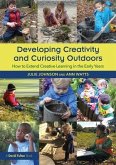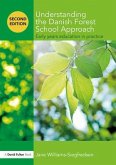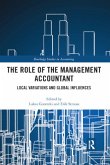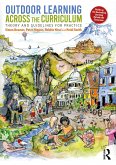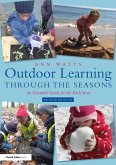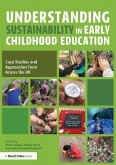Rachel Larimore, Claire Warden
Reimagining the Role of Teachers in Nature-Based Learning
Helping Children Be Curious, Confident, and Caring
25,99 €
inkl. MwSt.
Versandfertig in 6-10 Tagen

13 °P sammeln
Rachel Larimore, Claire Warden
Reimagining the Role of Teachers in Nature-Based Learning
Helping Children Be Curious, Confident, and Caring
- Broschiertes Buch
- Merkliste
- Auf die Merkliste
- Bewerten Bewerten
- Teilen
- Produkt teilen
- Produkterinnerung
- Produkterinnerung
Learn how to integrate nature-based pedagogy in this practical and inviting book. Nature-based teaching is getting more attention in early childhood education settings and can positively impact the development of young children's curiosity, confidence, and care. You'll learn to not only identify but also embody the many roles teachers play when implementing nature-based strategies. Chapters lay out the research and theory behind each role, specific language or behaviors of what that role looks like in practice, and reflexive questions to help educators reflect on their practice. This is…mehr
Andere Kunden interessierten sich auch für
![Developing Creativity and Curiosity Outdoors Developing Creativity and Curiosity Outdoors]() Julie Johnson (Peter Pan Nursery and UK Forest School)Developing Creativity and Curiosity Outdoors43,99 €
Julie Johnson (Peter Pan Nursery and UK Forest School)Developing Creativity and Curiosity Outdoors43,99 €![Understanding the Danish Forest School Approach Understanding the Danish Forest School Approach]() Jane Williams-SiegfredsenUnderstanding the Danish Forest School Approach31,99 €
Jane Williams-SiegfredsenUnderstanding the Danish Forest School Approach31,99 €![Research Methods in Outdoor Studies Research Methods in Outdoor Studies]() Research Methods in Outdoor Studies62,99 €
Research Methods in Outdoor Studies62,99 €![The Role of the Management Accountant The Role of the Management Accountant]() The Role of the Management Accountant45,99 €
The Role of the Management Accountant45,99 €![Outdoor Learning Across the Curriculum Outdoor Learning Across the Curriculum]() Simon Beames (Scotland University of Edinburgh)Outdoor Learning Across the Curriculum41,99 €
Simon Beames (Scotland University of Edinburgh)Outdoor Learning Across the Curriculum41,99 €![Outdoor Learning through the Seasons Outdoor Learning through the Seasons]() Ann Watts (UK Early Years Consultant)Outdoor Learning through the Seasons39,99 €
Ann Watts (UK Early Years Consultant)Outdoor Learning through the Seasons39,99 €![Understanding Sustainability in Early Childhood Education Understanding Sustainability in Early Childhood Education]() Understanding Sustainability in Early Childhood Education64,99 €
Understanding Sustainability in Early Childhood Education64,99 €-
-
-
Learn how to integrate nature-based pedagogy in this practical and inviting book. Nature-based teaching is getting more attention in early childhood education settings and can positively impact the development of young children's curiosity, confidence, and care. You'll learn to not only identify but also embody the many roles teachers play when implementing nature-based strategies. Chapters lay out the research and theory behind each role, specific language or behaviors of what that role looks like in practice, and reflexive questions to help educators reflect on their practice. This is perfect for in-service early childhood educators, including infant, toddler, preschool, and elementary providers, interested in more intentional use of nature in their teaching.
Produktdetails
- Produktdetails
- Verlag: Routledge / Taylor & Francis
- Seitenzahl: 142
- Erscheinungstermin: 29. Oktober 2024
- Englisch
- Abmessung: 229mm x 152mm x 9mm
- Gewicht: 290g
- ISBN-13: 9781032399409
- ISBN-10: 1032399406
- Artikelnr.: 70355674
- Herstellerkennzeichnung
- Libri GmbH
- Europaallee 1
- 36244 Bad Hersfeld
- gpsr@libri.de
- Verlag: Routledge / Taylor & Francis
- Seitenzahl: 142
- Erscheinungstermin: 29. Oktober 2024
- Englisch
- Abmessung: 229mm x 152mm x 9mm
- Gewicht: 290g
- ISBN-13: 9781032399409
- ISBN-10: 1032399406
- Artikelnr.: 70355674
- Herstellerkennzeichnung
- Libri GmbH
- Europaallee 1
- 36244 Bad Hersfeld
- gpsr@libri.de
Dr. Rachel A. Larimore is an educational consultant, speaker, researcher, and author of four previous books. Her work focuses on the intentional integration of nature to support young children's holistic development by learning with nature to expand their worlds and live rich, full lives. Dr. Claire W. Warden is an educational entrepreneur, researcher, and author of more than 10 books including her most recent, Green Teaching: Nature Pedagogies for Climate Change and Sustainability.
Acknowledgments
Meet the authors
About the book
Preface
Chapter 1: Introduction
Why confident, curious, and caring?
Confidence
Curiosity
Care
What is nature pedagogy?
Inside: Our individual & internal world
Outside: Our relationships with people and the planet
Beyond: Global community and the unobservable
Theory of social constructivism-The role of interactions in children's learning
Organization of this book
A note about language
Self-reflection
Chapter 2: Provider of space
Space to be in large groups
Space to be with one or two peers
Space to be alone
Shelter from the elements
Movable spaces
Circular spaces
Self-reflection
Chapter 3: Provider of time
Providing time for different purposes
Time for play
Time to notice
Time to fail and try again
Time to experience and sit with emotion
Time to build relationships
Time to just be
Time to be in and learn with the natural world
Time for silence
Embracing the pace of children and nature
Self-reflection
Chapter 4: Provider of materials
Types of materials and their play opportunities
Selecting materials for the classroom
Authentic materials
Developmentally appropriate materials
Materials that value diversity
Nature-related materials
Sustainable materials
Creating versus purchasing materials
Introducing materials to the classroom
Self-reflection
Chapter 5: Facilitator of experiences-Planning for children's learning
Stage 1. Noticed something and made a change to resources
Stage 2. Noticed something; took action; changed resources over a number of days
Stage 3. Noticed something; took action; changed resources over a number of days; adult was actively engaging in the area
Stage 4. Noticed something; took action; changed resources over a number of days; adult was actively engaging in the area; analysis of the learning
Self-reflection
Chapter 6: Holder of memories-Documenting children's learning
Outdoor documentation
Documenting curiosity, confidence, and care
Quality documentation
Floorbooks as an approach to documentation
Self-reflection
Chapter 7: Relationship builder-With self and others
Relationships inside, outside, and beyond
Inside: Relationships with self
Outside: Relationships with others and the natural world
Beyond: Relationships with something bigger than themselves
Caring for children is foundational to relationship building
Self-reflection
Chapter 8: Conversationalist
Questions and statements within a conversation
Affect during conversation
Emotion and tone of voice
Physicality
Deep listening
Self-reflection
Chapter 9: Manager and modeler of risk-taking
Modeling risk-taking
Intellectual risk
Social-emotional risk
Physical risk
Providing opportunities for risky experiences
Opportunities for intellectual risk
Opportunities for social-emotional risk
Opportunities for physical risk
Managing risky experiences
Managing intellectual and social-emotional risk
Managing physical risk
Supporting children to assess risky experiences for themselves
Self-reflection
Chapter 10: Provocateur
What do we mean by "provocation"?
Always being aware of the potential and possibilities of play
The pedagogical dance of child-led and teacher-led
Supporting curiosity, confidence, and care
Provocation through resources (i.e., living and nonliving)
Provocation through experience (e.g., storytelling, farmer visit)
Provocation of interaction
Self-reflection
Chapter 11: Mentor, guide, and leader
Apprenticeship approach
The importance of concepts, skills, and knowledge
Helping children apply skills and core knowledge to practical situations
Mentoring as a bridge-from here to there and now to then
Self-reflection
Chapter 12: Advocate
Advocating inside, outside, and beyond
Defenders of childhood
Self-reflection
Chapter 13: An invitation for deeper exploration
Exploring the character aspects educator roles
Self-aware
Open to new ideas with a personal growth mindset
Humble
Willingness to step back
Genuine
Engaged
Intentional-A thinker
Consistent
Knowledgeable
Playful
Wonderment
Inclusive
Your work matters
References and resources
Glossary of terms
Meet the authors
About the book
Preface
Chapter 1: Introduction
Why confident, curious, and caring?
Confidence
Curiosity
Care
What is nature pedagogy?
Inside: Our individual & internal world
Outside: Our relationships with people and the planet
Beyond: Global community and the unobservable
Theory of social constructivism-The role of interactions in children's learning
Organization of this book
A note about language
Self-reflection
Chapter 2: Provider of space
Space to be in large groups
Space to be with one or two peers
Space to be alone
Shelter from the elements
Movable spaces
Circular spaces
Self-reflection
Chapter 3: Provider of time
Providing time for different purposes
Time for play
Time to notice
Time to fail and try again
Time to experience and sit with emotion
Time to build relationships
Time to just be
Time to be in and learn with the natural world
Time for silence
Embracing the pace of children and nature
Self-reflection
Chapter 4: Provider of materials
Types of materials and their play opportunities
Selecting materials for the classroom
Authentic materials
Developmentally appropriate materials
Materials that value diversity
Nature-related materials
Sustainable materials
Creating versus purchasing materials
Introducing materials to the classroom
Self-reflection
Chapter 5: Facilitator of experiences-Planning for children's learning
Stage 1. Noticed something and made a change to resources
Stage 2. Noticed something; took action; changed resources over a number of days
Stage 3. Noticed something; took action; changed resources over a number of days; adult was actively engaging in the area
Stage 4. Noticed something; took action; changed resources over a number of days; adult was actively engaging in the area; analysis of the learning
Self-reflection
Chapter 6: Holder of memories-Documenting children's learning
Outdoor documentation
Documenting curiosity, confidence, and care
Quality documentation
Floorbooks as an approach to documentation
Self-reflection
Chapter 7: Relationship builder-With self and others
Relationships inside, outside, and beyond
Inside: Relationships with self
Outside: Relationships with others and the natural world
Beyond: Relationships with something bigger than themselves
Caring for children is foundational to relationship building
Self-reflection
Chapter 8: Conversationalist
Questions and statements within a conversation
Affect during conversation
Emotion and tone of voice
Physicality
Deep listening
Self-reflection
Chapter 9: Manager and modeler of risk-taking
Modeling risk-taking
Intellectual risk
Social-emotional risk
Physical risk
Providing opportunities for risky experiences
Opportunities for intellectual risk
Opportunities for social-emotional risk
Opportunities for physical risk
Managing risky experiences
Managing intellectual and social-emotional risk
Managing physical risk
Supporting children to assess risky experiences for themselves
Self-reflection
Chapter 10: Provocateur
What do we mean by "provocation"?
Always being aware of the potential and possibilities of play
The pedagogical dance of child-led and teacher-led
Supporting curiosity, confidence, and care
Provocation through resources (i.e., living and nonliving)
Provocation through experience (e.g., storytelling, farmer visit)
Provocation of interaction
Self-reflection
Chapter 11: Mentor, guide, and leader
Apprenticeship approach
The importance of concepts, skills, and knowledge
Helping children apply skills and core knowledge to practical situations
Mentoring as a bridge-from here to there and now to then
Self-reflection
Chapter 12: Advocate
Advocating inside, outside, and beyond
Defenders of childhood
Self-reflection
Chapter 13: An invitation for deeper exploration
Exploring the character aspects educator roles
Self-aware
Open to new ideas with a personal growth mindset
Humble
Willingness to step back
Genuine
Engaged
Intentional-A thinker
Consistent
Knowledgeable
Playful
Wonderment
Inclusive
Your work matters
References and resources
Glossary of terms
Acknowledgments
Meet the authors
About the book
Preface
Chapter 1: Introduction
Why confident, curious, and caring?
Confidence
Curiosity
Care
What is nature pedagogy?
Inside: Our individual & internal world
Outside: Our relationships with people and the planet
Beyond: Global community and the unobservable
Theory of social constructivism-The role of interactions in children's
learning
Organization of this book
A note about language
Self-reflection
Chapter 2: Provider of space
Space to be in large groups
Space to be with one or two peers
Space to be alone
Shelter from the elements
Movable spaces
Circular spaces
Self-reflection
Chapter 3: Provider of time
Providing time for different purposes
Time for play
Time to notice
Time to fail and try again
Time to experience and sit with emotion
Time to build relationships
Time to just be
Time to be in and learn with the natural world
Time for silence
Embracing the pace of children and nature
Self-reflection
Chapter 4: Provider of materials
Types of materials and their play opportunities
Selecting materials for the classroom
Authentic materials
Developmentally appropriate materials
Materials that value diversity
Nature-related materials
Sustainable materials
Creating versus purchasing materials
Introducing materials to the classroom
Self-reflection
Chapter 5: Facilitator of experiences-Planning for children's learning
Stage 1. Noticed something and made a change to resources
Stage 2. Noticed something; took action; changed resources over a number of
days
Stage 3. Noticed something; took action; changed resources over a number of
days; adult was actively engaging in the area
Stage 4. Noticed something; took action; changed resources over a number of
days; adult was actively engaging in the area; analysis of the learning
Self-reflection
Chapter 6: Holder of memories-Documenting children's learning
Outdoor documentation
Documenting curiosity, confidence, and care
Quality documentation
Floorbooks as an approach to documentation
Self-reflection
Chapter 7: Relationship builder-With self and others
Relationships inside, outside, and beyond
Inside: Relationships with self
Outside: Relationships with others and the natural world
Beyond: Relationships with something bigger than themselves
Caring for children is foundational to relationship building
Self-reflection
Chapter 8: Conversationalist
Questions and statements within a conversation
Affect during conversation
Emotion and tone of voice
Physicality
Deep listening
Self-reflection
Chapter 9: Manager and modeler of risk-taking
Modeling risk-taking
Intellectual risk
Social-emotional risk
Physical risk
Providing opportunities for risky experiences
Opportunities for intellectual risk
Opportunities for social-emotional risk
Opportunities for physical risk
Managing risky experiences
Managing intellectual and social-emotional risk
Managing physical risk
Supporting children to assess risky experiences for themselves
Self-reflection
Chapter 10: Provocateur
What do we mean by "provocation"?
Always being aware of the potential and possibilities of play
The pedagogical dance of child-led and teacher-led
Supporting curiosity, confidence, and care
Provocation through resources (i.e., living and nonliving)
Provocation through experience (e.g., storytelling, farmer visit)
Provocation of interaction
Self-reflection
Chapter 11: Mentor, guide, and leader
Apprenticeship approach
The importance of concepts, skills, and knowledge
Helping children apply skills and core knowledge to practical situations
Mentoring as a bridge-from here to there and now to then
Self-reflection
Chapter 12: Advocate
Advocating inside, outside, and beyond
Defenders of childhood
Self-reflection
Chapter 13: An invitation for deeper exploration
Exploring the character aspects educator roles
Self-aware
Open to new ideas with a personal growth mindset
Humble
Willingness to step back
Genuine
Engaged
Intentional-A thinker
Consistent
Knowledgeable
Playful
Wonderment
Inclusive
Your work matters
References and resources
Glossary of terms
Meet the authors
About the book
Preface
Chapter 1: Introduction
Why confident, curious, and caring?
Confidence
Curiosity
Care
What is nature pedagogy?
Inside: Our individual & internal world
Outside: Our relationships with people and the planet
Beyond: Global community and the unobservable
Theory of social constructivism-The role of interactions in children's
learning
Organization of this book
A note about language
Self-reflection
Chapter 2: Provider of space
Space to be in large groups
Space to be with one or two peers
Space to be alone
Shelter from the elements
Movable spaces
Circular spaces
Self-reflection
Chapter 3: Provider of time
Providing time for different purposes
Time for play
Time to notice
Time to fail and try again
Time to experience and sit with emotion
Time to build relationships
Time to just be
Time to be in and learn with the natural world
Time for silence
Embracing the pace of children and nature
Self-reflection
Chapter 4: Provider of materials
Types of materials and their play opportunities
Selecting materials for the classroom
Authentic materials
Developmentally appropriate materials
Materials that value diversity
Nature-related materials
Sustainable materials
Creating versus purchasing materials
Introducing materials to the classroom
Self-reflection
Chapter 5: Facilitator of experiences-Planning for children's learning
Stage 1. Noticed something and made a change to resources
Stage 2. Noticed something; took action; changed resources over a number of
days
Stage 3. Noticed something; took action; changed resources over a number of
days; adult was actively engaging in the area
Stage 4. Noticed something; took action; changed resources over a number of
days; adult was actively engaging in the area; analysis of the learning
Self-reflection
Chapter 6: Holder of memories-Documenting children's learning
Outdoor documentation
Documenting curiosity, confidence, and care
Quality documentation
Floorbooks as an approach to documentation
Self-reflection
Chapter 7: Relationship builder-With self and others
Relationships inside, outside, and beyond
Inside: Relationships with self
Outside: Relationships with others and the natural world
Beyond: Relationships with something bigger than themselves
Caring for children is foundational to relationship building
Self-reflection
Chapter 8: Conversationalist
Questions and statements within a conversation
Affect during conversation
Emotion and tone of voice
Physicality
Deep listening
Self-reflection
Chapter 9: Manager and modeler of risk-taking
Modeling risk-taking
Intellectual risk
Social-emotional risk
Physical risk
Providing opportunities for risky experiences
Opportunities for intellectual risk
Opportunities for social-emotional risk
Opportunities for physical risk
Managing risky experiences
Managing intellectual and social-emotional risk
Managing physical risk
Supporting children to assess risky experiences for themselves
Self-reflection
Chapter 10: Provocateur
What do we mean by "provocation"?
Always being aware of the potential and possibilities of play
The pedagogical dance of child-led and teacher-led
Supporting curiosity, confidence, and care
Provocation through resources (i.e., living and nonliving)
Provocation through experience (e.g., storytelling, farmer visit)
Provocation of interaction
Self-reflection
Chapter 11: Mentor, guide, and leader
Apprenticeship approach
The importance of concepts, skills, and knowledge
Helping children apply skills and core knowledge to practical situations
Mentoring as a bridge-from here to there and now to then
Self-reflection
Chapter 12: Advocate
Advocating inside, outside, and beyond
Defenders of childhood
Self-reflection
Chapter 13: An invitation for deeper exploration
Exploring the character aspects educator roles
Self-aware
Open to new ideas with a personal growth mindset
Humble
Willingness to step back
Genuine
Engaged
Intentional-A thinker
Consistent
Knowledgeable
Playful
Wonderment
Inclusive
Your work matters
References and resources
Glossary of terms
Acknowledgments
Meet the authors
About the book
Preface
Chapter 1: Introduction
Why confident, curious, and caring?
Confidence
Curiosity
Care
What is nature pedagogy?
Inside: Our individual & internal world
Outside: Our relationships with people and the planet
Beyond: Global community and the unobservable
Theory of social constructivism-The role of interactions in children's learning
Organization of this book
A note about language
Self-reflection
Chapter 2: Provider of space
Space to be in large groups
Space to be with one or two peers
Space to be alone
Shelter from the elements
Movable spaces
Circular spaces
Self-reflection
Chapter 3: Provider of time
Providing time for different purposes
Time for play
Time to notice
Time to fail and try again
Time to experience and sit with emotion
Time to build relationships
Time to just be
Time to be in and learn with the natural world
Time for silence
Embracing the pace of children and nature
Self-reflection
Chapter 4: Provider of materials
Types of materials and their play opportunities
Selecting materials for the classroom
Authentic materials
Developmentally appropriate materials
Materials that value diversity
Nature-related materials
Sustainable materials
Creating versus purchasing materials
Introducing materials to the classroom
Self-reflection
Chapter 5: Facilitator of experiences-Planning for children's learning
Stage 1. Noticed something and made a change to resources
Stage 2. Noticed something; took action; changed resources over a number of days
Stage 3. Noticed something; took action; changed resources over a number of days; adult was actively engaging in the area
Stage 4. Noticed something; took action; changed resources over a number of days; adult was actively engaging in the area; analysis of the learning
Self-reflection
Chapter 6: Holder of memories-Documenting children's learning
Outdoor documentation
Documenting curiosity, confidence, and care
Quality documentation
Floorbooks as an approach to documentation
Self-reflection
Chapter 7: Relationship builder-With self and others
Relationships inside, outside, and beyond
Inside: Relationships with self
Outside: Relationships with others and the natural world
Beyond: Relationships with something bigger than themselves
Caring for children is foundational to relationship building
Self-reflection
Chapter 8: Conversationalist
Questions and statements within a conversation
Affect during conversation
Emotion and tone of voice
Physicality
Deep listening
Self-reflection
Chapter 9: Manager and modeler of risk-taking
Modeling risk-taking
Intellectual risk
Social-emotional risk
Physical risk
Providing opportunities for risky experiences
Opportunities for intellectual risk
Opportunities for social-emotional risk
Opportunities for physical risk
Managing risky experiences
Managing intellectual and social-emotional risk
Managing physical risk
Supporting children to assess risky experiences for themselves
Self-reflection
Chapter 10: Provocateur
What do we mean by "provocation"?
Always being aware of the potential and possibilities of play
The pedagogical dance of child-led and teacher-led
Supporting curiosity, confidence, and care
Provocation through resources (i.e., living and nonliving)
Provocation through experience (e.g., storytelling, farmer visit)
Provocation of interaction
Self-reflection
Chapter 11: Mentor, guide, and leader
Apprenticeship approach
The importance of concepts, skills, and knowledge
Helping children apply skills and core knowledge to practical situations
Mentoring as a bridge-from here to there and now to then
Self-reflection
Chapter 12: Advocate
Advocating inside, outside, and beyond
Defenders of childhood
Self-reflection
Chapter 13: An invitation for deeper exploration
Exploring the character aspects educator roles
Self-aware
Open to new ideas with a personal growth mindset
Humble
Willingness to step back
Genuine
Engaged
Intentional-A thinker
Consistent
Knowledgeable
Playful
Wonderment
Inclusive
Your work matters
References and resources
Glossary of terms
Meet the authors
About the book
Preface
Chapter 1: Introduction
Why confident, curious, and caring?
Confidence
Curiosity
Care
What is nature pedagogy?
Inside: Our individual & internal world
Outside: Our relationships with people and the planet
Beyond: Global community and the unobservable
Theory of social constructivism-The role of interactions in children's learning
Organization of this book
A note about language
Self-reflection
Chapter 2: Provider of space
Space to be in large groups
Space to be with one or two peers
Space to be alone
Shelter from the elements
Movable spaces
Circular spaces
Self-reflection
Chapter 3: Provider of time
Providing time for different purposes
Time for play
Time to notice
Time to fail and try again
Time to experience and sit with emotion
Time to build relationships
Time to just be
Time to be in and learn with the natural world
Time for silence
Embracing the pace of children and nature
Self-reflection
Chapter 4: Provider of materials
Types of materials and their play opportunities
Selecting materials for the classroom
Authentic materials
Developmentally appropriate materials
Materials that value diversity
Nature-related materials
Sustainable materials
Creating versus purchasing materials
Introducing materials to the classroom
Self-reflection
Chapter 5: Facilitator of experiences-Planning for children's learning
Stage 1. Noticed something and made a change to resources
Stage 2. Noticed something; took action; changed resources over a number of days
Stage 3. Noticed something; took action; changed resources over a number of days; adult was actively engaging in the area
Stage 4. Noticed something; took action; changed resources over a number of days; adult was actively engaging in the area; analysis of the learning
Self-reflection
Chapter 6: Holder of memories-Documenting children's learning
Outdoor documentation
Documenting curiosity, confidence, and care
Quality documentation
Floorbooks as an approach to documentation
Self-reflection
Chapter 7: Relationship builder-With self and others
Relationships inside, outside, and beyond
Inside: Relationships with self
Outside: Relationships with others and the natural world
Beyond: Relationships with something bigger than themselves
Caring for children is foundational to relationship building
Self-reflection
Chapter 8: Conversationalist
Questions and statements within a conversation
Affect during conversation
Emotion and tone of voice
Physicality
Deep listening
Self-reflection
Chapter 9: Manager and modeler of risk-taking
Modeling risk-taking
Intellectual risk
Social-emotional risk
Physical risk
Providing opportunities for risky experiences
Opportunities for intellectual risk
Opportunities for social-emotional risk
Opportunities for physical risk
Managing risky experiences
Managing intellectual and social-emotional risk
Managing physical risk
Supporting children to assess risky experiences for themselves
Self-reflection
Chapter 10: Provocateur
What do we mean by "provocation"?
Always being aware of the potential and possibilities of play
The pedagogical dance of child-led and teacher-led
Supporting curiosity, confidence, and care
Provocation through resources (i.e., living and nonliving)
Provocation through experience (e.g., storytelling, farmer visit)
Provocation of interaction
Self-reflection
Chapter 11: Mentor, guide, and leader
Apprenticeship approach
The importance of concepts, skills, and knowledge
Helping children apply skills and core knowledge to practical situations
Mentoring as a bridge-from here to there and now to then
Self-reflection
Chapter 12: Advocate
Advocating inside, outside, and beyond
Defenders of childhood
Self-reflection
Chapter 13: An invitation for deeper exploration
Exploring the character aspects educator roles
Self-aware
Open to new ideas with a personal growth mindset
Humble
Willingness to step back
Genuine
Engaged
Intentional-A thinker
Consistent
Knowledgeable
Playful
Wonderment
Inclusive
Your work matters
References and resources
Glossary of terms
Acknowledgments
Meet the authors
About the book
Preface
Chapter 1: Introduction
Why confident, curious, and caring?
Confidence
Curiosity
Care
What is nature pedagogy?
Inside: Our individual & internal world
Outside: Our relationships with people and the planet
Beyond: Global community and the unobservable
Theory of social constructivism-The role of interactions in children's
learning
Organization of this book
A note about language
Self-reflection
Chapter 2: Provider of space
Space to be in large groups
Space to be with one or two peers
Space to be alone
Shelter from the elements
Movable spaces
Circular spaces
Self-reflection
Chapter 3: Provider of time
Providing time for different purposes
Time for play
Time to notice
Time to fail and try again
Time to experience and sit with emotion
Time to build relationships
Time to just be
Time to be in and learn with the natural world
Time for silence
Embracing the pace of children and nature
Self-reflection
Chapter 4: Provider of materials
Types of materials and their play opportunities
Selecting materials for the classroom
Authentic materials
Developmentally appropriate materials
Materials that value diversity
Nature-related materials
Sustainable materials
Creating versus purchasing materials
Introducing materials to the classroom
Self-reflection
Chapter 5: Facilitator of experiences-Planning for children's learning
Stage 1. Noticed something and made a change to resources
Stage 2. Noticed something; took action; changed resources over a number of
days
Stage 3. Noticed something; took action; changed resources over a number of
days; adult was actively engaging in the area
Stage 4. Noticed something; took action; changed resources over a number of
days; adult was actively engaging in the area; analysis of the learning
Self-reflection
Chapter 6: Holder of memories-Documenting children's learning
Outdoor documentation
Documenting curiosity, confidence, and care
Quality documentation
Floorbooks as an approach to documentation
Self-reflection
Chapter 7: Relationship builder-With self and others
Relationships inside, outside, and beyond
Inside: Relationships with self
Outside: Relationships with others and the natural world
Beyond: Relationships with something bigger than themselves
Caring for children is foundational to relationship building
Self-reflection
Chapter 8: Conversationalist
Questions and statements within a conversation
Affect during conversation
Emotion and tone of voice
Physicality
Deep listening
Self-reflection
Chapter 9: Manager and modeler of risk-taking
Modeling risk-taking
Intellectual risk
Social-emotional risk
Physical risk
Providing opportunities for risky experiences
Opportunities for intellectual risk
Opportunities for social-emotional risk
Opportunities for physical risk
Managing risky experiences
Managing intellectual and social-emotional risk
Managing physical risk
Supporting children to assess risky experiences for themselves
Self-reflection
Chapter 10: Provocateur
What do we mean by "provocation"?
Always being aware of the potential and possibilities of play
The pedagogical dance of child-led and teacher-led
Supporting curiosity, confidence, and care
Provocation through resources (i.e., living and nonliving)
Provocation through experience (e.g., storytelling, farmer visit)
Provocation of interaction
Self-reflection
Chapter 11: Mentor, guide, and leader
Apprenticeship approach
The importance of concepts, skills, and knowledge
Helping children apply skills and core knowledge to practical situations
Mentoring as a bridge-from here to there and now to then
Self-reflection
Chapter 12: Advocate
Advocating inside, outside, and beyond
Defenders of childhood
Self-reflection
Chapter 13: An invitation for deeper exploration
Exploring the character aspects educator roles
Self-aware
Open to new ideas with a personal growth mindset
Humble
Willingness to step back
Genuine
Engaged
Intentional-A thinker
Consistent
Knowledgeable
Playful
Wonderment
Inclusive
Your work matters
References and resources
Glossary of terms
Meet the authors
About the book
Preface
Chapter 1: Introduction
Why confident, curious, and caring?
Confidence
Curiosity
Care
What is nature pedagogy?
Inside: Our individual & internal world
Outside: Our relationships with people and the planet
Beyond: Global community and the unobservable
Theory of social constructivism-The role of interactions in children's
learning
Organization of this book
A note about language
Self-reflection
Chapter 2: Provider of space
Space to be in large groups
Space to be with one or two peers
Space to be alone
Shelter from the elements
Movable spaces
Circular spaces
Self-reflection
Chapter 3: Provider of time
Providing time for different purposes
Time for play
Time to notice
Time to fail and try again
Time to experience and sit with emotion
Time to build relationships
Time to just be
Time to be in and learn with the natural world
Time for silence
Embracing the pace of children and nature
Self-reflection
Chapter 4: Provider of materials
Types of materials and their play opportunities
Selecting materials for the classroom
Authentic materials
Developmentally appropriate materials
Materials that value diversity
Nature-related materials
Sustainable materials
Creating versus purchasing materials
Introducing materials to the classroom
Self-reflection
Chapter 5: Facilitator of experiences-Planning for children's learning
Stage 1. Noticed something and made a change to resources
Stage 2. Noticed something; took action; changed resources over a number of
days
Stage 3. Noticed something; took action; changed resources over a number of
days; adult was actively engaging in the area
Stage 4. Noticed something; took action; changed resources over a number of
days; adult was actively engaging in the area; analysis of the learning
Self-reflection
Chapter 6: Holder of memories-Documenting children's learning
Outdoor documentation
Documenting curiosity, confidence, and care
Quality documentation
Floorbooks as an approach to documentation
Self-reflection
Chapter 7: Relationship builder-With self and others
Relationships inside, outside, and beyond
Inside: Relationships with self
Outside: Relationships with others and the natural world
Beyond: Relationships with something bigger than themselves
Caring for children is foundational to relationship building
Self-reflection
Chapter 8: Conversationalist
Questions and statements within a conversation
Affect during conversation
Emotion and tone of voice
Physicality
Deep listening
Self-reflection
Chapter 9: Manager and modeler of risk-taking
Modeling risk-taking
Intellectual risk
Social-emotional risk
Physical risk
Providing opportunities for risky experiences
Opportunities for intellectual risk
Opportunities for social-emotional risk
Opportunities for physical risk
Managing risky experiences
Managing intellectual and social-emotional risk
Managing physical risk
Supporting children to assess risky experiences for themselves
Self-reflection
Chapter 10: Provocateur
What do we mean by "provocation"?
Always being aware of the potential and possibilities of play
The pedagogical dance of child-led and teacher-led
Supporting curiosity, confidence, and care
Provocation through resources (i.e., living and nonliving)
Provocation through experience (e.g., storytelling, farmer visit)
Provocation of interaction
Self-reflection
Chapter 11: Mentor, guide, and leader
Apprenticeship approach
The importance of concepts, skills, and knowledge
Helping children apply skills and core knowledge to practical situations
Mentoring as a bridge-from here to there and now to then
Self-reflection
Chapter 12: Advocate
Advocating inside, outside, and beyond
Defenders of childhood
Self-reflection
Chapter 13: An invitation for deeper exploration
Exploring the character aspects educator roles
Self-aware
Open to new ideas with a personal growth mindset
Humble
Willingness to step back
Genuine
Engaged
Intentional-A thinker
Consistent
Knowledgeable
Playful
Wonderment
Inclusive
Your work matters
References and resources
Glossary of terms

